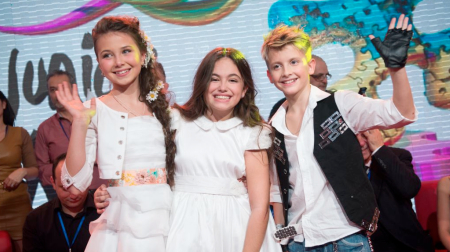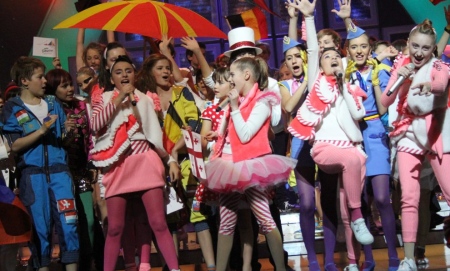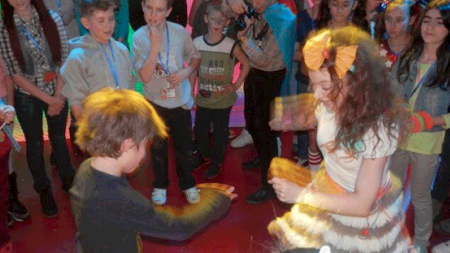It’s just over two weeks until the 2014 edition of the Junior Eurovision Song Contest takes place in Malta. ESC Insight will be heading to the island of song (and our second shipyard of the year) to cover the event. Kicking off our coverage, Dr Paul Jordan looks at the contrasting views of the Junior Eurovision Song Contest across the continent.
Part of the beauty of the Eurovision Song Contest, and arguably one of the reasons why it has lasted for nearly 60 years, is its ability to capture the public imagination and provoke debate. The Contest’s younger cousin, the Junior Eurovision Song Contest, is no exception.
Since Junior Eurovision (JESC) began in 2003 it has stimulated discussions among the Eurovision community and indeed the wider press. Certainly in the United Kingdom, the majority of the discourse has centred on whether it’s an appropriate format for children, or indeed if there is an audience for such a thing. This hasn’t necessarily been the case in other parts of Europe, namely the East.
Split Down The Rhine
Whilst the majority of broadcasters in the West, including the UK and Spain, have turned their backs on the Junior format after a handful of appearances; others such as Georgia, Belarus, Russia, and Armenia seem to have lapped it up. It seems that when it comes to Junior Eurovision, Europe sits in two distinct camps, so to speak.

JESC 2013 Podium
Much of the discourse among UK Eurovision fans and in some of the (albeit limited) mainstream press that JESC attracts, is about the fundamental nature of the Contest. There is a view that child contests are a little passé, or even a little creepy. In other countries there isn’t the same baggage and the event is enjoyed for what it is, a family entertainment show.
How it is that in some countries the viewing figures are dire and yet others the show remains popular? It all comes down to taste (a bigger question which itself has never been settled with the adult format let alone Junior!) The decision by ITV to withdraw from JESC after three appearances was more likely to do with viewing figures for JESC compared to their new show ‘The X-Factor’ which had debuted in 2004) than any sort of moral objection to children performing. In some countries child contests are very much the norm, JESC is merely an extension of this.
This isn’t necessarily a purely Eastern European thing either since Scandinavia had a similar format, the MGP Nordic; and the broadcasters continue to run MGP Junior, Melodi Grand Prix Junior, and Lilla Melodifestivalen.
WIll You Let Them Entertain You?
I think fundamentally the JESC highlights a division on what is considered acceptable light entertainment. Beauty pageants are another case in point; events such as Miss World have been shunned by some and embraced by others. There are junior versions of beauty pageants. Even blackface has been allowed on mainstream TV recently (Greece’s Mando being a more famous example). Whilst obviously comparisons between these and JESC are problematic, it does demonstrate that what is either appealing or acceptable in one country or culture is not necessarily the same in another.

Junior Eurovision 2011 (Elke Roels, EBU)
As a general rule, junior formats tend not to do as well as the originals. A few examples include: SClub7 vs SClub Juniors, The Voice vs The Voice Kids, ESC vs JESC. Could it be that in this context, JESC shouldn’t be judged in relation to its older, more established cousin, but with comparable contests and offshoots?
The Eurovision Song Contest took more than a decade to root itself in popular culture, could the same be said for Junior, especially given that the context of broadcasting has rapidly changed in this digital age? Personally I’ve never really followed Junior Eurovision. As harsh as this might sound, the singing voices of most of the contestants go right through me. That said, I thought the 2008 documentary film “Sounds Like Teen Spirit” was superb. The crew followed various participants through their Eurovision journey, charting the highs and lows of the experience from their perspective.
Seeing the pressure some of those youngsters were under, for me, raised a question of whether it was fair or right to be putting kids under such a spotlight at such a young age…. but is this any different to playing junior football for a national team, medal tests at ballet classes, or music exams to obtain specific grades? Children and especially teenagers are not isolated from the pressure of competition if they wish to go down that path, and comparisons with Junior Eurovision should be made in a like-for-like environment.
The EBU have taken a number of steps to address these issues (Ben Robertson will have more on that in the near future here on ESC Insight), but in the meantime Junior Eurovision’s Kath Lockett wanted to highlight the JESC ‘Code of Ethics’
“It is our responsibility to create and maintain a safe and appropriate environment for the participants and to always make our decisions considering the best interest of the participants,” she told ESC Insight. “The children are to be protected from any inappropriate or unreasonable demands and to be socialising, resting, performing and competing in an environment that fosters respect and understanding.”

JESC 2013 Dance-off between Azerbaijan and Armenia
Moving On
Despite criticisms of the JESC format, it has continued to evolve. It has navigated a tricky period of stagnation over the last few years, to get to 2014 and the twelfth Contest.
Given that the global financial crisis has seen TV companies tighten their belts, I think the survival of JESC is absolutely to the credit of the organisers. One of the biggest ironies of the entire event is that those countries that bemoan their lack of success in Adult Eurovision, such as the UK and Spain, have actually done really well in JESC. Yet they still withdrew.
You can’t win them all but you can continue to take part and embrace the experience; Italy, Slovenia and Montenegro will all take to the Junior Eurovision stage for the first time this year. As preparations take place in Malta, it’ll be interesting to see how the format continues to evolve in the future.








